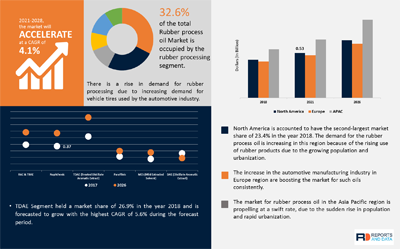Global rubber process oil market forecast at $2.9 billion by 2028
New York, NY – The global rubber process oil market size was $2,118.4 million in 2020 and is expected to reach a value of $2,927.6 million by 2028, and register a CAGR of 4.10 percent during the forecast period, according to Reports and Data. Rubber process oil is used for manufacturing multiple rubber compounds, and it improves dispersion and flow characteristics of compounds during processing.
Rubber process oil enhances physical vulcanization properties and reduces the cost of final rubber compound-based products, which is a key factor expected to drive market growth. This oil is compatible with almost any type of elastomers, which makes it suitable for a large number of applications.
Rubber process oils are available in a variety of types such as RAE (residual aromatic extract) and TRAE (treated residual aromatic extract), TDAE (treated distillate aromatic extract) and paraffinic, among various other products. These rubber oils are largely used for applications in industries including oil and gas, automotive and construction, among others. The rubber oil is used to manufacture tires and other types of equipment used in the transportation and automotive industries because it can withstand conditions on any surface and extreme weather conditions and meets all the safety norms made by government.
Fluctuating raw material costs and concerns regarding usage of non-biodegradable oils are major factors that could hamper growth of the global market. Availability of substitutes such as soybean oil used in tire manufacturing is another factor that could hamper market growth to some extent.
The TDAE (treated distillate aromatic extract) segment accounted for the largest revenue share in 2020. This is due to increasing preference for TDAE owing to it properties of green and environmentally-friendly oil. This oil is non-carcinogenic in nature and is also used as an ingredient in aromatic oils. Treated distillate aromatic extracts are used to manufacture high quality rubbers and tires. Stringent regulations outlawing use of DAE, especially in Europe, have resulted in higher demand and adoption of TDAE, which is another factor driving growth of this segment.
The rubber processing segment accounted for the largest revenue share in the global market in 2020. This is due to the growing scope of its applications in medical, construction and automotive industries.
The automotive and transportation segment is expected to register the highest CAGR during the forecast period. Increasing adoption of rubber process oil for manufacturing floor mats, tires, seals, hoses, belts and tubes for cars due to the low viscosity properties of oil is a factor expected to drive revenue growth of the segment.
The North American market is expected to account for the second largest revenue share in 2020. Demand for rubber process oil is rapidly growing due to its usage in a wide range of applications in various end use industries such as oil and gas, construction, automotive and pharmaceuticals in the region.
The European market accounted for moderate revenue share in the global market in 2020, owing to well developed end use industries. However, the EU Directive imposed a ban on the use of polycyclic aromatic hydrocarbons (PAHs) in extender oils in tire manufacturing, and the growing adoption of substitutes such as soybean oil for rubber process oil in manufacturing tires is a factor that could hamper growth of the Europe rubber process oil market.
Repsol S.A, Chevron Corporation, Nynas AB, Witmans Industries Pvt. Ltd., Gulf Petroleum Ltd., Behran Oil Company, Orgkhim Biochemical Holding, Royal Dutch Shell PLC, Petronas Lubricants Belgium NV and Gandhar Oil Refinery Limited are market players. The market players have adopted various strategies, including mergers, acquisitions, partnerships and new product developments, among other strategies, to stay ahead of the competition and expand market footprint.

